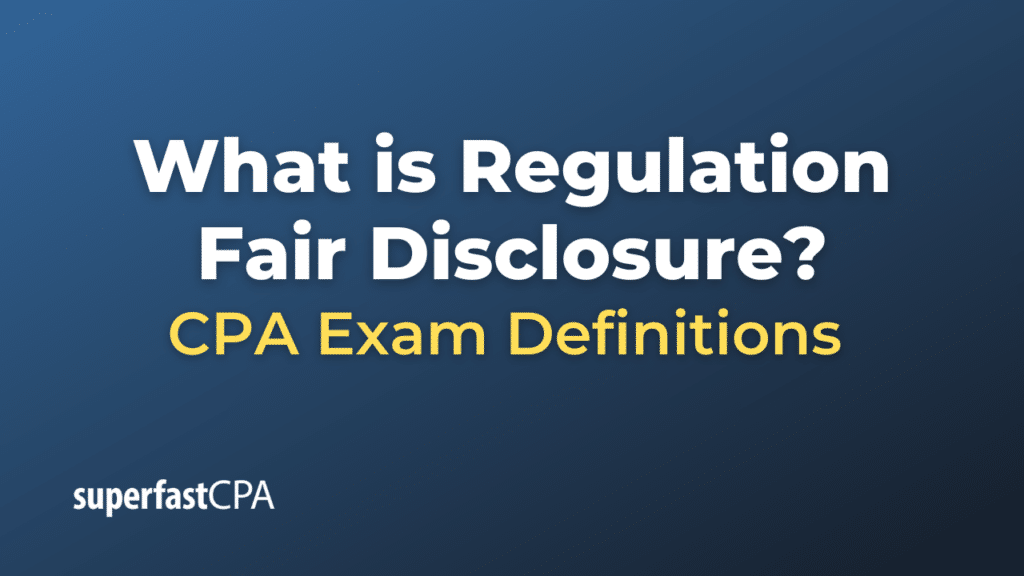Regulation Fair Disclosure
Regulation Fair Disclosure, commonly referred to as Reg FD, is a rule promulgated by the U.S. Securities and Exchange Commission (SEC) that addresses the selective disclosure of information by publicly traded companies and other issuers.
Reg FD aims to promote full and fair disclosure. It was established to level the playing field by ensuring that all investors, whether they are large institutional investors or individual retail investors, have equal access to material non-public information.
Key Points of Reg FD:
- Selective Disclosure: Before Reg FD, it was not uncommon for companies to disclose important information to select individuals or groups (e.g., analysts or institutional investors) before making that information available to the general public. Such selective disclosure could give certain investors an unfair advantage.
- Material Information : Reg FD concerns the dissemination of “material” information. Information is considered material if there’s a substantial likelihood that a reasonable shareholder would consider it important in making an investment decision.
- Broad Dissemination: If a company discloses material non-public information to any person who is not bound by a duty of confidentiality (like analysts), it must simultaneously disclose that information to the public. If a company inadvertently discloses material information, it must promptly disclose that information publicly.
- Intentional vs. Non-intentional Disclosure: The rule differentiates between intentional and unintentional disclosures. Intentional disclosure requires simultaneous public disclosure, whereas for unintentional disclosure, the company needs to make public disclosure promptly after realizing such disclosure was made.
- Exemptions: Certain communications, such as discussions in connection with most offerings of securities registered under the Securities Act, are exempt from the scope of Reg FD.
- No Requirement to Disclose: It’s essential to note that Reg FD doesn’t require disclosure of material non-public information. It just mandates that if such disclosure is made to one group, it must be made to all.
- Sanctions for Violations: Violations of Reg FD can lead to sanctions by the SEC against the issuer and potentially against the individuals involved.
The enactment of Reg FD marked a significant step towards ensuring that all investors have equal access to material information at the same time, promoting fairness and transparency in the securities markets.
Example of Regulation Fair Disclosure
Let’s consider a hypothetical scenario involving a potential violation of Regulation Fair Disclosure (Reg FD).
TechBlitz Inc., a publicly traded tech company, has been developing a revolutionary new product that they believe will significantly boost their revenues and market share. The CEO, Mr. Smith, is excited about the prospects and the potential positive impact on the stock price.
One evening, Mr. Smith attends an industry gala. At the event, he runs into Ms. Jane, a well-known technology analyst from a prominent investment bank. They discuss the industry, TechBlitz’s performance, and future prospects.
In the flow of conversation, excited about the upcoming product, Mr. Smith hints to Ms. Jane that TechBlitz is on the verge of announcing a “game-changing” product that will “exceed all current revenue projections.”
The next morning, before any public announcement is made by TechBlitz, Ms. Jane publishes a research note upgrading TechBlitz’s stock with a hint about an upcoming major product launch. The stock price of TechBlitz shoots up 10% by midday.
This is a potential violation of Reg FD. Mr. Smith, the CEO, selectively disclosed material non-public information to Ms. Jane before it was available to the general public.
Upon realizing the mistake (or being alerted by their legal/compliance team):
- Prompt Public Disclosure: To rectify the situation, TechBlitz should immediately issue a public statement or press release, disclosing the same information about the new product that Mr. Smith shared with Ms. Jane.
- Internal Review: The company might conduct an internal review to determine the nature and extent of the information that was disclosed. This would also involve determining whether the disclosure was truly “material.”
- Training & Policies: TechBlitz should ensure that all senior executives and persons privy to material non-public information are trained on Reg FD. They should also ensure robust policies are in place to prevent such inadvertent disclosures in the future.
- Potential SEC Investigation: If the SEC believes there’s been a violation of Reg FD, they could launch an investigation. If TechBlitz is found to have violated Reg FD, they could face sanctions.
This example underscores the importance of maintaining strict controls over the dissemination of material non-public information and ensuring all stakeholders are well-educated on the principles of fair disclosure.













